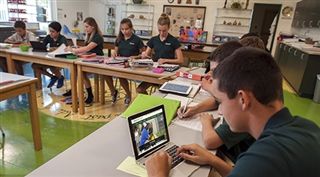

When You Hit the Books and the Books Hit Back
November 18, 2014
One thing I hear about studying for science and history from students is: “I studied for hours, but I still didn’t do as well on the test.” Parents can usually attest that their students have indeed “ hit the books”, but a poor test grade after all that work can be frustrating to say the least. The purpose of this article is to look at what should be studied, how to study it, and more importantly how to recall what you have studied for the test.
What to Study:
Generally all the material that is presented in science and history are presented in lecture or lab work. Therefore lecture and lab notes are important. One way to improve retention is to take your lecture or lab notes and review five minutes at night. Another suggestion is if possible refine or rewrite your notes. If you’re a math person think of it as a formula: read +write + study = success. Any parent should be able to tell their child this is how you memorize information. It may be “old school” but it works.
Don’t forget about the textbook and handouts. Textbooks and handouts are often thought of as a supplement to a lecture or lab. Many students will tell you, “I never read the text or the handouts.” Use the text! Some teachers test only from lectures while others test heavily from the text (even if the text material has not been discussed). I often hear students say, “…but she never told us that in class.” It is up to the student to determine what the teacher expects out of them. Many teachers test over material they have assigned as reading. If a student has been told to read it, it is fair game for the test.
Rules to follow for what students should study:
- If it is discussed in lecture it is important. The more time spent on it the more important it is.
- You should always try to guess what questions will be on the test and study that material first. Why and how? For instance, the first and the last thing an instructor says is usually important. The more important ideas are usually said after the first 10 minutes of class. Teachers usually use clue words to emphasize important points. It’s a good bet that these points will be on the test.
- When taking notes your child should write down anything that your teacher starts with the following: “the most”, “the best”, “the first”, “the last”. Words like these are clues for future test questions. When looking over their notes, students should make questions up to quiz themselves, based on what they think the teacher emphasized with key words, and spent the most time on in class. Thinking like the teacher will improve your test grade.
- Know all terminology and study all figures presented in class.
How to study:
There is no single “best” way to study. Each student must find the best method for them. However, three components are common to all:
- Study in short bursts.
- Repetition is key to moving information. You must actively review the material. Make practice tests that you take and correct, make and study flash cards, self quizzing are all methods that work. However, learning something requires effort, it also takes time, there are no shortcuts when it comes to memorizing.
Test Taking Tips:
- Teachers always remind student to read the questions carefully. However, many students don’t take the time to make sure they understand what is being asked and thus get the wrong answer.
- Learning to watch for danger words in multiple choice and true-false questions like “all,” “always,” “every,” “never,” and “none. Because there are no exceptions to the statement when these words are used the statement is usually false.
- Essay questions are often hard for middle school students. Practice by making up essays to practice on. Review with your child that answering an essay question requires them to make a statement that answers the question and then support it with facts. The teacher does not want their opinion they want to see if they can support their point.
Warning: Make sure sentences in the essay are clear and complete. I always tell students to act like they are explaining it to someone who knows nothing about the subject.
4. Be neat, and check over what you wrote to make sure it makes sense.
4. Be neat, and check over what you wrote to make sure it makes sense.
Parents, you can’t take the test for your child, but you can help your child hit back and learn to improve his/her test scores by using some of the suggestions above.
References
James, Elizabeth and Carol Barkin. How to be School Smart. Lothrop, Lee & Shepard Books, New York. 1988.
Pearce, Frank. Biology Study Skills. West Valley College, 1995.

















